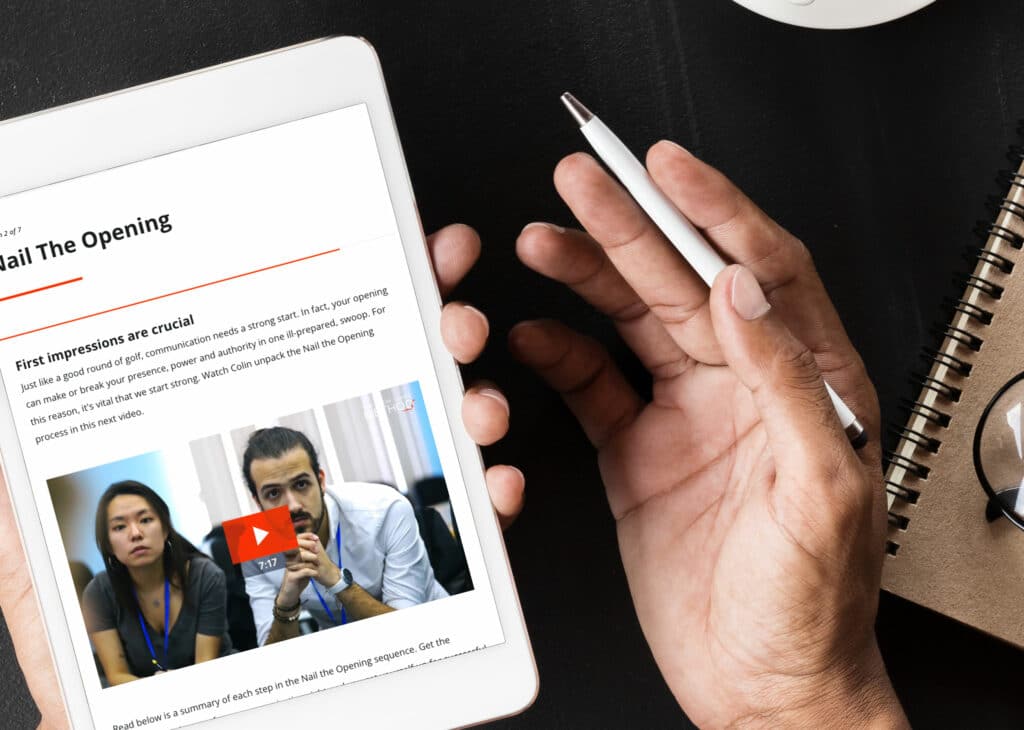“Every time you have to speak, you are auditioning for leadership”
– James Humes, author and former presidential speechwriter.
In pursuit of our ambitions, the strength of our communication will often determine how far we can go. If you yearn to lead the pack, you need to stand out.
Here are 20 tips to communicate like a true leader.
1. Project confidence to assure others you can handle it
Close your eyes and imagine a ship on the ocean, ahead in its path is a turbulent storm. At the wheel is the captain, slouched over with their arms crossed and their head down.
Do you have faith in them to lead you through the storm to safer waters?
Probably not.
Our posture plays a big role in the way people perceive us. Plant your feet firmly on the ground and lift upward through the spine, then roll your shoulders back and slightly raise your chin.
Do you feel ready to steer the ship?
Chances are others will think you are as well.
2. Don’t be rigid, show others you are open to change
Strong leadership requires an eye for continued progress and innovation.
Not sure where to start?
Try shaking up the norm by revamping the way you hold meetings with your team. We recommend ditching the PowerPoint slides and focussing on delivering a clear message, show you value your team by honouring strict timeframes and cut the frequency of meetings in half – you’ll notice the difference, we promise.
3. Avoid misunderstandings – be conscious of hand gestures
Have you ever noticed how our mouths can say one thing, but our hands say another?
Be conscious of the way you use your hands by practising gestures that match the intent behind what you are saying.
For instance…
When addressing a group, pointing your finger for emphasis can seem like you are blaming them, or singling them out. Try lightly closing your fist with your index finger and thumb together as though you are holding something for a softer gesture when you deliver each point.
4. Keep your message clean and simple so everyone can follow
Great leaders don’t need to prove they are smart by using big words when they communicate.
Quite the contrary…
They strip it back so everyone in the room can follow.
When you are sharing something with others, simplify your message by getting straight to the point and remove the unnecessary bits in between.
Be clear and concise – this is the true language of leadership.
5. Set the tone to get the most out of your team
Did you ever have a class you dreaded going to because the teacher shouted more than they spoke, or their delivery was so mundane and dreary you struggled to focus?
The way you interact and behave has a strong impact on those around you.
Especially when you’re the leader.
This is why we need to set the right tone to ensure we can get the most out of our team. If you present with the highest level of respect and regard to each person and their involvement of each task, you will facilitate their best work.
6. Bring some energy to keep them listening
With today’s unremitting distraction of technology and content overload, holding someone’s attention can be a challenge at the best of times!
So how can we grab hold of their attention?
The energy we bring to every conversation often determines how long someone is able to engage.
Try moving your hands to embellish your point or use up the stage with some spatial anchoring during your next presentation. Bring light and shade into the way you communicate, this takes people on a journey and holds their attention for longer.
7. Ditch the data and frame your message in a story for deeper engagement
Storytelling is an invaluable tool for connecting you with an audience. It creates an emotional bond that keeps others completely engrossed in what you’re saying.
Some of the greatest leaders in history were artful storytellers.
How can this help, you ask?
Business storytelling can be used to persuade others, provide context, inspire action and be more memorable when you communicate.
8. Build better relationships by learning people’s names
This may seem simple, but it is actually a skill that takes concerted effort and practice to master.
It’s worth it, though – you’ll be amazed at what a difference it makes to how you are perceived.
9. Take the stage and master public speaking
This is a vital communication skill for leadership. Sharing our ideas and inspiring action from others often requires us to speak before a group and deliver in an engaging way.
Not your forte?
Practice, practice, practice.
Or if you need some extra help, invest in some professional development training.
10. Read body language for the whole truth
Not only do leaders use body language to assist in delivering their own messages, they are also acutely aware of the non-verbal cues going on around them.
Take more notice of how people are holding themselves and what they are doing with their hands when they communicate.
Are they fidgeting, do they seem stressed? Do they appear closed off to the information you are sharing?
Reading body language can provide a deeper insight into their view.
11. Don’t be afraid to say no
If you think leadership means overloading yourself with responsibility, you are mistaken.
You can’t pour from an empty cup.
Learn to say no when you need to and set boundaries after hours to give yourself the space to unwind and recharge.
12. Think, then speak – not the other way around!
If someone sounds unsure of their point, how likely are you to believe in what they are saying?
So, how do you get them on board?
Share your ideas with confidence and conviction to get others get on board. When we take a moment to think before we open our mouth we articulate our point more clearly.
Be sure of yourself and your input to avoid drawing a blank mid-sentence and filling the silence with “ums” and “ahs”- they dilute the strength of your message.
13. Maintain your authenticity by staying true to yourself
No one likes a people pleaser, stick to your guns and others will have more respect for you.
Strong leaders are true to themselves and communicate honestly with their team.
Don’t sacrifice your authenticity by trying to impress others because you are worried what they might think of you, be consistent in your messages.
14. Keep your professional integrity and gain the trust of others with the honesty policy
In order for your colleagues to follow your lead, they first need to trust you.
Strong professional relationships are built on honesty – if you always remain open and truthful when communicating your view, you will establish a solid foundation for trust in the long run.
15. Avoid wasting people’s time by framing your ideas within their world
Have you ever sat through a presentation or a meeting that felt utterly irrelevant to you?
With a stack of responsibilities already on our plate, the moment we realise something doesn’t apply to us, we immediately switch off. This is why if you fail to create relevance for your audience your message will fall on deaf ears.
Make sure you know your audience and their needs.
Strong communicators ensure their message speaks to every individual in the room. Do your research before you speak, so everyone understands why it is important to them.
16. Always allow for the input of others when you speak so they feel valued
There is a reason why we have two ears and only one mouth – to listen more!
Avoid speaking at people without giving them time to respond. Conversations are a two-way street.
17. A little self-awareness goes a long way
Despite what many assume, your colleagues are not mind readers.
Be conscious of your inner monologue and self-aware as you communicate to avoid misunderstandings like taking a bad mood out on someone else or saying something careless that might offend.
18. Avoid getting a snooty rep, speak to and treat everyone equally
Just because you are striving for the top, doesn’t mean you should treat everyone as though they are beneath you.
Leave your ego at home, great leaders treat everyone equal.
Trying to establish a hierarchy to climb your way up will not only tarnish your reputation, it won’t facilitate an environment for innovation and effective problem-solving.
For your colleagues to feel valued and welcome to share their ideas, you need to establish an open playing field by treating everyone as equal.
19. Encourage an open feedback loop to better yourself
The business world is fast-paced, competitive and constantly shifting.
It’s tough out there!
Professional leadership requires a constant thirst for learning and improvement, which is why an open feedback loop is fundamental to the adaptability and growth of organisations.
Welcome constructive criticism and advice from your colleagues, as well as offering your honest feedback to them on a regular basis.
20. Invest in professional development training to accelerate your skills with ongoing support
The pursuit of learning is paramount to our success as industries change and the workforce continues to transform.
While this list provides some insight into how you can step up your communication skills, it only really scrapes the surface. The best outcomes arise from self-investment by learning to advance your abilities through professional development training.
Wondering where you can start?
Great leaders know how to inspire action fast from their team, learn to do this with the power of business storytelling. Our 90-minute introductory Masterclass, The Art of Persuasive Storytelling is the perfect place to develop your skills and begin learning how to engage your audience on a deeper level.

The Colin James Method® Facilitators train corporate executives to improve their leadership skills with a proven methodology. Our highly trained Facilitators and Coaches are recognised for their experience in their fields and have worked with many individuals and organisations around the world to master the art of communication.










